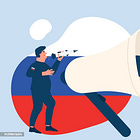A friendly reminder that Rant! is a reader-supported publication. Thank you for making this newsletter possible!
ALEX’S WEEKLY RANT
Several people have asked me if the bomb threats Russia called in to Democrat-leaning polling places during Tuesday’s election had any effect on the vote. These threats, which arrived at polling stations by email from Russia-based accounts, strangely targeted very specific locations that, had this election been close, might have played an outsized role in providing that handful of votes to turn things one way or the other.
But that wasn’t the case. Trump won, by a lot. There is zero evidence that the disruption caused by the bomb threats affected the vote. But while Russia had nothing to do with the votes specifically—Russia didn’t hack machines and switch vote counts, for example—it’s impossible to say the Kremlin didn’t affect the election.
Russia ran a massive influence operation aimed at electing Trump. Whether that manipulation of the information ecosystem changed anyone’s vote is impossible to say, but it absolutely did shape the information space in which we debated and communicated.
Here’s a sampling of what America was up against:
Russia was behind a number of false narratives, including that Kamala Harris did a hit and run and that Tim Walz assaulted a student when he was a coach. Some false narratives are seeded by Russia and come out of the mouths of our own politicians, which I wrote about here.
Russia created fake videos about ballot fraud, echoing Trump’s rhetoric that the vote must be rigged and thus calling into question the integrity of the entire electoral system. In a funny turn in history, that narrative about how messed up the system is quickly disappeared once a big Trump win was clear.
Hundreds (thousands?) of other false narratives grew out of the Doppelgänger operation, which spoofed legitimate media sites to pass off false stories, an operation I wrote about here.
People like John Mark Dougan—an American in Moscow handled by Russian intelligence—and Ben Swann—who made content for Russian state-run propaganda media outlet RT and for American audiences—both of whom I wrote about here, helped push false narratives using a huge network of fake accounts.
Russia helped grow the far-right movement by boosting many of its influencers, and many right-wing influencers, in turn, boosted Russian narratives. Tenet media, home of such right-wing influencers as Tim Pool and Benny Johnson, and which I wrote about here, was financed by Russia and took direction from Russia. It was certainly not the only platform taking taskings from the Kremlin.
Elon Musk, who became Trump’s biggest cheerleader and donor and who rigged X (formerly Twitter) to push far-right lies, has been in regular contact with Vladimir Putin and, if you read between the lines of this Wall Street Journal story, he very clearly responds well to tasking, as we say in the intelligence business.
Jill Stein, another Kremlin asset, did her part to play spoiler.
Even the bomb threats are worrying. They fit the pattern of other operations we’ve seen of Russia understanding campaign polling information in order to target hyper-specific groups of voters. We saw this with the Social Design Agency and its Project Good Old USA, which I wrote about here and here, which targeted 18 specific communities in swing states to push Kremlin narratives and support a Trump victory. This fits a pattern. In 2016 Trump campaign chairman Paul Manafort provided precisely this type of information to Konstantin Kilimnik, a Russian agent.
Remember, as well, that the Russia investigation and the Senate investigation into Russian influence in US elections in 2016 both found Trump responsive to outreach from Russia. Republicans and the media have done a good job whitewashing these facts, but they are facts.
(After I finished writing this Rant!, the New York Times published this article, which outlines other Russian influence campaigns aimed at the election.)
The issue here isn’t whether any single Russian campaign changed any individual vote. Trump’s victory was decisive this time. But we can’t say Russia had nothing to do with the information environment in which we held the election.
And here’s some bad news: Trump deftly applies the same tactics as Russia to manipulate information to his advantage. Our information space is about to get worse.
THE WEEK’S LINKS
A roundup of things you should be reading
RUSSIA
Mapping Russia’s War Machine on NATO’s Doorstep (VSquare)
Alex Finley is a former officer of the CIA’s Directorate of Operations, where she served in West Africa and Europe. She writes and teaches about terrorism, disinformation / covert influence, and oligarch yachts. Her writing has appeared in Slate, Reductress, Funny or Die, POLITICO, The Center for Public Integrity, and other publications. She has spoken to the BBC, MSNBC, CNN, C-SPAN’s Washington Journal, France24, and numerous other media outlets. She was also invited once to speak at Harvard, which she now tells everyone within the first ten seconds of meeting them. She is the author of the Victor Caro series, satirical novels about the CIA. Before joining the CIA, Alex was a journalist, covering Capitol Hill, the Pentagon, and the Department of Energy. She reported on issues related to national security, intelligence, and homeland security. Did she mention she was invited to speak at Harvard?











The free world minus the US must find a way to remove Putin and his gang of thugs from power and isolate Russia so that its society collapses - more than it already is. The payment of reparations to Ukraine must be paramount using the oligarch treasury. Trump isn’t going to serve to the end of his term due to his mental decline. Rather than focus on him focus on Vance as the heir apparent.
Bets that Putin told Musk and Trump that the CIA was siphoning billions through covert programs and that if they got access to Treasury data, they’d be able to find it? And that Xi gave them a special-access Chinese LLM “designed to hunt for waste fraud & abuse?”